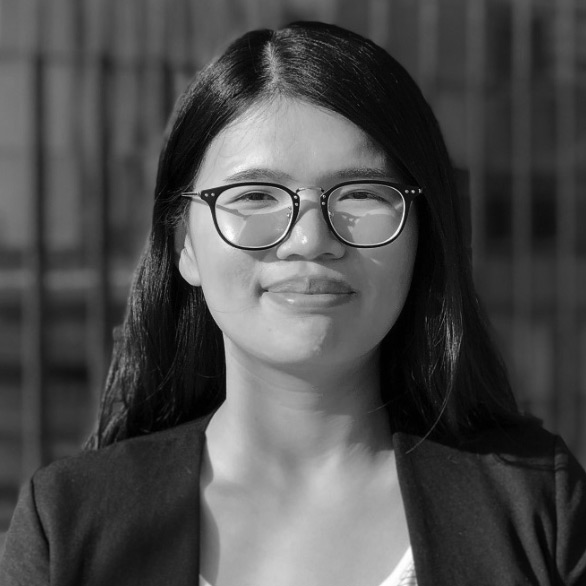We sat down with Yuwei Ma, Associate Project Manager, to talk about complex digital models in healthcare and global perspectives in master planning. Yuwei holds a Bachelor of Architecture degree from Sichuan University in China and a Master of Architecture degree from the University of Southern California.
Yuwei, what brought you to Jensen Partners? How has your time been here?
I completed my Master of Architecture degree at the University of Southern California here in LA. Upon graduation, I started an internship at Jensen Partners, and six months later, I received an offer for a permanent role. In architecture school, most people go to architecture firms, but I learned so much at Jensen Partners that I wanted to continue in this boutique firm. This is such a rewarding job full of opportunities.
Healthcare is an area we didn’t cover much in architecture school. It’s a very complicated field that requires lots of specialized knowledge. Jensen Partners was attractive to me right away because of the challenging nature of the work. Also, I have been very happy at this workplace. I enjoy the people I work with in our team and also among our clients. We are responding to solving major problems in healthcare, and it’s been very fulfilling.
What are some benefits of approaching healthcare projects from a perspective that includes, but is not limited to, architecture?
I think what I learned in architecture school applies here, but that needs to scale up. At Jensen Partners, we take a bird’s eye view of hospitals and systems, which requires paying attention to a wide range of aspects: market analysis, communication with doctors and nurses, site planning. My coworkers are a very diverse group of people. We have nurses, construction managers, and others on the team, and each person’s experience brings forth unique contributions. All of this allows us to approach a master plan from multiple angles and results in our clients’ ability to provide better care at greater value.
You completed your undergraduate studies in China. How has it been bringing that perspective and knowledge to the US’ context?
The undergraduate architecture experience in China was quite different from the US education in that I learned a lot about codes, rules, efficiency, and people. Here, there is more flexibility and encouragement to be creative. In terms of healthcare and reimbursements, the two systems are vastly different, too.
My goal is to be a senior medical planner in the future, and I initially thought I would go back to China and contribute to healthcare there. Medical planning and healthcare architecture in China are in their earlier stages, and I think the country would really benefit from the expertise of a specialized firm such as ours. I want to definitely build bridges between the countries, and at Jensen Partners, our team is exploring ways to do so. A lot of outdated hospitals in China can use remodeling and planning for the future of care, and public investment for healthcare there is quite high.
Architects in China are skilled and can design great buildings and spaces; yet, our firm brings knowledge around how to configure programming, how people and operations flow in hospital settings, and more. I think what hospital systems in China need is people like us who can communicate with various programs and identify what’s needed in each context. That expertise and comprehensive approach will unquestionably improve healthcare in China.
That’s very insightful. Would you share with us a bit about one of the projects you are working on?
Yes, of course. For instance, I work on the Denver Health System master plan, and this hospital is a crucial part of Denver and Colorado. My role with that has been through creating complex digital models, graphics, 3d modeling and imaging, as well as through creating renderings. We provide visuals that outline how the campus is today and what we really need to provide better care. We help clients understand how the master plan will impact their campus. With Denver Health, we work with communities and proposed various renovations and remodels. We then pass on the master plan to architects and structural engineers to create the details of the project. I primarily work with my colleague Damir on this project and learn immensely from his ideas.
We always offer clients several options so they are better informed about considerations that go to each path. These are quite complicated, and my job is to use graphics to demonstrate movements that make it easier for our clients to understand and communicate the plan. Since I have a strong background in architecture, I get to walk clients through floor plans, space management, and scope of service. We also do thorough site analyses by going to the space and talking with people who spend most of their time there.
Excellent. Lastly, how has it been working with a team under Sarah and Frances’ leadership?
It’s been really, really helpful for my career. Both Sarah and Frances, as well as others in the leadership team, have multiple decades of experience each, and they know the business exceptionally well. With that, they have built a company culture where more junior coworkers, such as myself, are very valued and can contribute creatively. Your title or years of experience do not limit you here. People join various projects, learn from different contexts and carry that knowledge over to their future projects. And my coworkers are really, really willing to help anytime anyone has questions.
Sounds incredible, Yuwei. Thank you for speaking with us! We look forward to sharing more of your insights again later.

